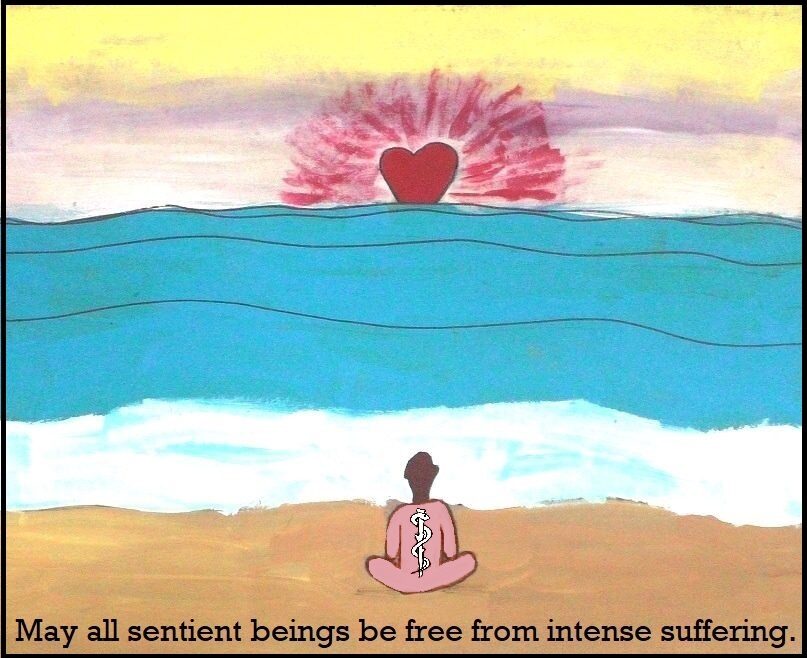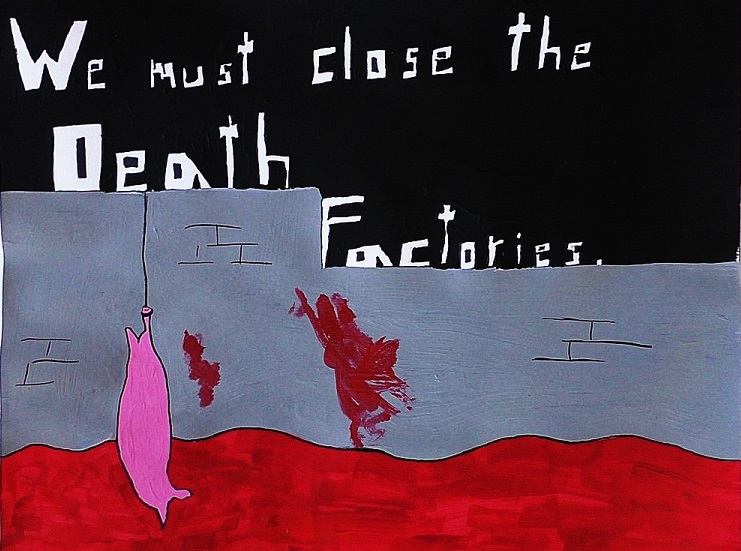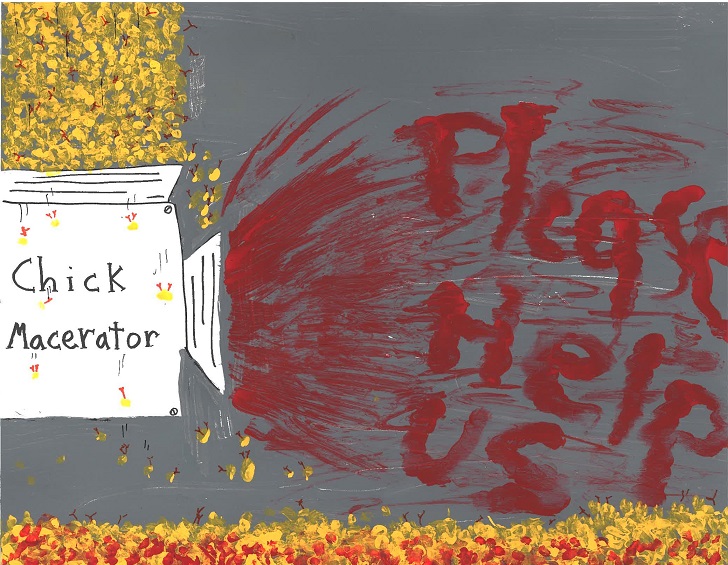“We Must Close the Death Factories”: A few words on farm animal advocacy
“Each day is an opportunity to take concrete steps to relieve suffering.”
-Jonathon Leighton
Intro
“For it is as though we forget that suffering exists when we are not confronted with it directly.”
-Magnus Vinding
I have been a vegetarian for ~11 years and a vegan for ~5 years (as of 2022). Throughout these years animal advocacy has played an on-again off-again role in my life; I’ve written letters to the editors protesting industrial chicken farming, attended horse-racing protests, and distributed vegan literature in public . . .when I felt up to it. But admittedly, for a lot of that time my attention drifted elsewhere. I’d start reading about art history, or watching classic aggressive rollerblading videos–or veritably pissing my pants reading Mad Magazine, and I’d sort-of “forget” about the unspeakable suffering that animals endure every day (31 Billion land animals at any given time1 , not including fish) on factory farms. This gradual loss of interest in something you care about is called value drift. The human brain is incredible: It allows a person to learn about suffering, feel shocked by it, commit to do something about the problem, and then slowly ignore and forget it. I guess when you aren’t the one suffering it’s optional whether you care or not, as opposed to the beings who have to live in the immediacy of their misery.
But I do care, and inevitably I’ll watch a video or read an essay about the atrocious living conditions of animals on industrial farms and remember that I have to do something about this. Not that I’m particularly suited to help tackle this problem, or an expert in the field of animal welfare, but once you’re reminded of the intensity and quantity of suffering on factory farms (like in the video below), and its impact on marginalized(Black, Brown, and Indigenous communities) peoples throughout the world through environmental racism, a worsening of the global food crisis, and the hastening of climate change, it’s impossible not to feel the urge to reach out and help:
What can be done?
It’s not always clear what the average individual can do about systemic farm animal suffering, but I think there are a few practical steps any animal advocate can take:
- This may seem obvious, but learn as much as you can about intensive animal farming, and keep learning! It’s important to keep up with new information, and to keep reminding yourself of the magnitude and intensity of the problem. To learn more, I highly recommend subscribing to Open Philanthropy Project’s Farm Animal Welfare Research Newsletter. Also, Sentient Media and VegNews are great sources of information about current farm animal rights issues. Here are some quick facts about factory farming:
- According to Faunalytics, there are 70 Billion land animals slaughtered annually for food around the globe.2
- As noted by the ASPCA, farmed animals suffer from:
a) “Physical alterations like teeth-clipping or tail-docking, performed without anesthetic”,
b) “Illnesses and injuries left unnoticed or untreated, often due to an unmanageable ratio of animals to workers”,
c) “Rough or abusive handling by workers, often due to a lack of training, frustration at poor working conditions, unreasonable demands by superiors or poor design of facilities”, and “Cages and overcrowding.”3
- Sentience Institute estimates that “around 31.0 billion land animals and 38.8 to 215.9 billion fish are being farmed globally at any given time.”4
- “When people hear about industrial pollution, most often think about factories with billowing smokestacks. However, the food industry, with its animal farms and slaughterhouses, can also be considered a major contributor of pollution that affects the health of Black, Brown, and Indigenous communities and low-income communities, because more often than not they locate their facilities in the areas where these people live.”5
2. Another thing you can do to improve the welfare of farmed animals is donate or get involved with a grassroots animal rights organizations. There are plenty of great animal rights groups doing important work, like performing undercover investigations on factory farms, pressuring corporations to improve welfare standards, organizing farm workers to demand better working conditions, and demonstrating against the agro-industrial complex. A few organizations doing this work are Mercy for Animals, Animal Equality, Animal Activism Mentorship, and Slaughterfree Network. Other organizations are developing and promoting alternatives to traditional meat, like New Harvest and The Good Food Institute.
3) You could also get interested in politics. Animal welfare is a global issue, and constituents could pressure their representatives to support laws that improve the lives of farmed animals, both in their country and abroad. Groups like League of Humane Voters (LOHV) and Voters for Animal Rights (VFAR) are dedicated to this cause. A summary of LOHV’s advocacy process, taken directly from their website, says : “Those who hold elective office can pass and enforce laws to protect animals. After careful interviews, the LOHV endorses candidates and then campaigns for their election to public office. We then get out the vote and deliver it for our candidates. Once in office, we lobby the office-holders we helped to get elected to help us enact animal protective legislation.”7 Getting involved with these organizations is a good way to meet different animal advocates and hear their perspectives. You will also learn how the legislative process works and can then advocate for practicable, down-to-earth solutions to the (desperately needing of a solution) problem of factory farming. There is a precedent for political action improving the lives of farmed animals.
4) When in doubt, do what you do, and do what best fits you personally! Make art, write essays, dance, play music, start a website, talk to people on the street, or do whatever you can to spread compassion for farmed animals suffering in the agro-industrial complex. Also, meetup with like-minded animal advocates either online or in person(or both!) and help build the animal advocacy community!
Conclusion
It’s seems probable that serious reforms to the animal agriculture system (including abolition/replacement) will come from systemic, technological, and political change, rather than exclusively from individual consumer boycott efforts. The development of “clean” meat and corporate pledges to improve the conditions of farmed animals seems like a promising start towards building momentum in dismantling the factory farming industry, along with political reform. Hopefully a confluence of these factors will lead to a breaking point, where the idea of consuming sentient beings for dinner becomes morally untenable to a large majority of people. Anyone compassionately and peacefully advocating for farmed animals is crucial to the movement! You are important! You matter! So let’s work together and bring about the end of factory farming, forevermore.
Citations
- Leighton, Jonathon. “Guided Meditation for Activists”. Youtube. Uploaded Jan. 5 2017. https://www.youtube.com/watch?v=D2YZew3Knj8&t=400s . Accessed 17 Jan. 2021.
- Vinding, Magnus. Suffering-Focused Ethics. Copenhagen, Ratio Ethica, 2020.
- https://www.sentienceinstitute.org/global-animal-farming-estimates. Accessed on 13 Jan. 2021.
- Sanders, Bas. “Global Animal Slaughter Statistics and Charts.” Faunalytics. https://faunalytics.org/global-animal-slaughter-statistics-and-charts/#:~:text=Worldwide%2C%20more%20than%2070%20billion,killed%20for%20food%20every%20year. Accessed 16 Jan. 2021.
- ASPCA. “Farm Animal Welfare”. ASPCA. https://www.aspca.org/animal-cruelty/farm-animal-welfare. Accessed on 16 Jan. 2021.
- Anthis, Kelly. “Global Farmed & Factory Farmed Animals Estimates”. Sentience Institute. https://www.sentienceinstitute.org/global-animal-farming-estimates. Accessed 16 Jan. 2021.
- Food Empowerment Project. “ENVIRONMENTAL RACISM”. foodispower.org, https://foodispower.org/environmental-and-global/environmental-racism/. Accessed June 24 2022.
- Animal Charity Evaluators. “Who We Are”. Animal Charity Evaluators. https://animalcharityevaluators.org/about/background/who-we-are/. Accessed on 16 Jan. 2021.
- League of Humane Voters. “League of Humane Voters-Mission”. League of Humane Voters. http://lohv.org/. Accessed on 16 Jan. 2021.
Video credit:
- Animals Australia. “How slaughterhouses kill thousands of chickens an hour”. Youtube. Uploaded Nov. 25 2020. https://www.youtube.com/watch?v=uJXSYMhtwvU. Accessed June 23 2022.
Image Credit:
- Author. “We Must Close the Death Factories”.
- Author. “Chick Macerator”.


